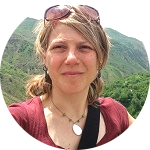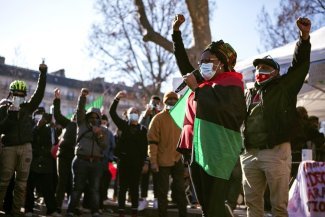Still reeling from a deadly terror attack in a majority Kurdish town near the Syrian border, Turkey’s Kurds say they are targeted once again – this time by the counterterrorism measures their own government has taken in response.
Since the 20 July killing of 31 Kurdish and Turkish activists in the town of Suruç by a suicide bomber linked to Islamic State, Turkey has rounded up hundreds of people and blocked dozens of websites and Twitter accounts.
“More than 1,300 people have been detained and almost 900 of them are our members and activists; it is a kind of psychological war on us,” says Nazmı Gür, a former deputy from the eastern city of Van for the Peoples’ Democratic Party (HDP).
The group made history in June by becoming the first Kurdish-rooted party to pass Turkey’s high 10 per cent election threshold for parliamentary representation. Previously, HDP members like Gür had run as independents to circumvent the threshold.
The government’s own numbers bear out Gür’s claim that more Kurds than Islamic State militants have been taken into custody – 847 compared to 137, according to Deputy Prime Minister Bülent Arınç. Ankara says those detained are supporters of the Kurdistan Workers’ Party (PKK), which has waged a decades-long armed conflict against the Turkish state.
Over the past week, Turkey has also engaged in airstrikes targeting Islamic State in Syria and the PKK in Iraq following renewed PKK attacks on Turkish security forces.
“Turkey cannot stand by as Kurdish, leftist, and Islamic State militants target Turkey,” Prime Minister Ahmet Davutoğlu said as the airstrikes began. “We will take necessary measures against whoever constitutes a threat to our border.”
Though the HDP under co-leader Selahattin Demirtaş has sought to distance itself from the PKK, the two groups share overlapping bases of support among Turkey’s Kurds. Kurdish activists have frequently faced prosecution on terrorism charges that are often seen as politically motivated.
Turkish President Recep Tayyip Erdoğan accused Demirtaş himself of harbouring pro-PKK sympathies and called for parliament to strip HDP lawmakers of their immunity from prosecution. “You keep working with the terrorist organisation, you will pay the price for it,” the president said.
Two days later, Turkish prosecutors opened a case against Demirtaş, alleging that he provoked Kurds into the streets for demonstrations that turned deadly last fall. An investigation was subsequently launched against the HDP’s other co-leader, Figen Yüksekdağ, on “terrorism propaganda” charges.
Such moves create a “risk that what we’ve seen in the past in terms of unfair prosecutions targeting Kurdish activists and politicians and others will return, that people will again be targeted [simply] for their political beliefs,” according to Andrew Gardner, the Turkey researcher for Amnesty International.
Earlier steps by Turkey’s governing Justice and Development Party (AKP) towards making positive reforms to uphold the rights of Kurds and others have been followed, he says, by “very negative trends bringing into force more repressive laws.”
These include new restrictions on the Internet and a controversial internal security law passed by parliament this spring, which, Gardner says, “legitimised dangerous practices that already existed including arbitrary arrests and use of lethal force by the police.”
The crackdown on Kurds sends a chilling signal to other would-be political opponents of the AKP as well.
“The message we saw starting with Gezi [Park protests in summer 2013] is that the AKP and Erdoğan are not prepared to tolerate any form of dissent, regardless of whether it’s expressed democratically or not,” says Turkey expert Gareth Jenkins, a senior associate fellow with the Silk Road Studies Program.
“These new moves will also be taken note of by other opponents outside of the Kurdish movement,” Jenkins says.
The new pressure on the HDP also conveys a message to Kurds that previous calls to them to solve conflicts by participating in parliamentary politics instead of engaging in violence were “not sincere,” Jenkins adds. But the party says it remains steadfast in its faith in the democratic process.
“In a democratic country, all parties must respect the results of an election,” says the HDP’s Gur. “This is what Mr. Davutoğlu said to us before the [7 June] election — whether you pass [the 10 per cent threshold] or not, you must respect the results — and we openly declared that we would.
“Now we expect AKP and Mr. Erdoğan to respect the results of this election and the 80 [parliamentary] seats of HDP and the 6 million people who voted for us.”









